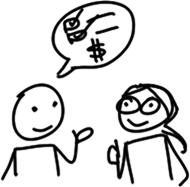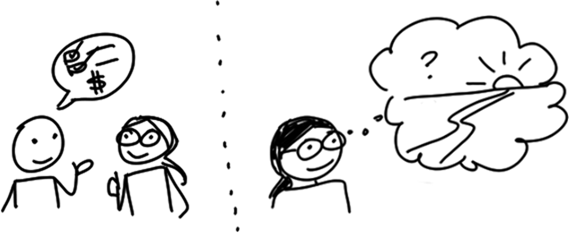Reflecting on a month of experimenting with Proper Retirement
Posted: - Modified: | experimentWhen I started on my 5-year experiment, I hedged my bets by thinking of it as semi-retirement. I was open to working part-time on a flexible basis. Consulting worked out well for that. People also wanted me to work on illustrations and sketchnotes, and I figured that was a great way to spread visual thinking while being paid to learn. I earned more than I expected, creating a good safety margin for my experiment and making it easier to plan continuing it.
Because I didn’t want to settle into too much of a familiar pattern, I interrupted my experiment with month-long sub-experiments. One month, I travelled for a conference and spent time with my family. Another time, I focused on building a sketchnoting business.
This August, I experimented with my idea of Proper Retirement: living with minimal commitments, following my interests. I didn’t do anything billable, aside from the occasional check-in with my existing consulting clients when they raised the bat signal. I didn’t look for new work. I slept in without guilt. It gave me the time to work on some personal projects and build some skills.
I didn’t get around to everything, but I like the progress I made. I wrote a lot, learning more about outlining and illustration. I drew a series of sketchnoting tutorials. I outlined book ideas. I updated my archive of favourite posts. I learned more about researching. I reached out and chatted with people online. It was good. And I actually earned a smidge of income from the pay-what-you-can e-resources on my site, so yay that!
I like this focus on self-directed projects. No clients means no easy source of feedback, no built-in challenges, and no direct transactions for income–but it also means less stress, less commitment, less chasing down of accounts receivables. If I get better at planning what to work on and getting feedback from people through Twitter and blog posts, I can be my own client.
Besides, this arrangement forces me to get better at planning for different circumstances. I anticipate that life is going to get even more variable, not less, and that it will be harder to make commitments, rather than easier. It makes sense to learn how to manage my time and create value instead of being comfortable with the guidance that client projects give me in terms of schedule and initiative.
So now what? I want to experiment more with taking the initiative. I’m probably going to wind down my consulting over the next four months. My clients are doing well, which is exactly what should be happening. Although people sometimes ask me to sketchnote events, I might wind that down as well, referring the work to other people I know in Toronto and elsewhere. It’s interesting, but it’s also an hours-for-money swap, and I tend to get better information density from books. (And less performance anxiety?) I’ll take care of my existing clients’ needs, and I’ll pass other opportunities on. It feels a little weird to say no to things, but that’s part of the experiment: to learn how to be less afraid of closing doors and moving on, knowing that in many cases, I might be able to reopen those doors if I need to.
What could this look like if I focused on doing things that I chose? Writing and drawing still have their place. Writing lends itself to packaging, of course. I get the occasional unexpected bonus from Amazon affiliate links or Gumroad sales. Maybe someday I’d even make my peace with advertising, although I’m not sure about that. As for drawing, perhaps I’ll make stock images and more interesting guides. Maybe writing and drawing will come together in course development. Maybe I’ll take the occasional professional writing or illustration gig. Maybe I’ll learn how to pitch freelance articles to magazines and blogs. Maybe we’ll see how the next few years changes the landscape.
There’s some benefit to staying in business, and some costs too. I have a corporation, and that’s been very useful. I’ll keep it around as I slowly disburse what I need from it in the form of dividends (or a salary, if I can justify that). Having a corporation involves some ongoing costs for paperwork and things like that, which I’ve been fine with doing so far. The benefits for working under the umbrella of a corporation include a little tax flexibility (which was really helpful when I was going full-tilt as a consultant) and some tax savings involving business expenses.
My income’s probably going to be a fraction of what it used to be. There might even be years when it would be negligible, perhaps below expenses. The CRA bulletin IT504R2 has this to say about visual artists and writers:
In the case of an artist or writer, it is possible that a taxpayer may not realize a profit during his or her lifetime but still have a reasonable expectation of profit. However, in order to have this "reasonable expectation of profit" the artistic or literary endeavours, as the case may be, of the artist or writer must be carried on in a manner such that, based on the criteria in ¶ 5above, they may be considered for income tax purposes to be the carrying on of a business rather than, for example, a hobby.
The criteria mentioned are:
(a) the amount of time devoted to artistic or literary endeavours,
(b) the extent to which an artist or writer has presented his or her own works in public and private settings including, but not limited to, exhibiting, publishing and reading as is appropriate to the nature of the work,
(c) the extent to which an artist is represented by an art dealer or agent and the extent to which a writer is represented by a publisher or agent,
(d) the amount of time devoted to, and type of activity normally pursued in, promoting and marketing the artist’s or writer’s own works,
(e) the amount of revenue received that is relevant to the artist’s or writer’s own works including, but not limited to, revenue from sales, commissions, royalties, fees, grants and awards which may reasonably be included in business income,
(f) the historical record, spanning a significant number of years, of annual profits or losses relevant to the artist’s or writer’s exploitation of his or her own works,
(g) a variation, over a period of time, in the value or popularity of the individual’s artistic or literary works,
(h) the type of expenditures claimed and their relevance to the endeavours (e.g., in the case of a writer there would be a positive indication of business activity if a substantial portion of the expenditures were incurred for research),
(i) the artist’s or writer’s qualifications as an artist or writer, respectively, as evidenced by education and also by public and peer recognition received in the form of honours, awards, prizes and/or critical appraisal,
(j) membership in any professional association of artists or writers whose membership or categories of membership are limited under standards established by that association,
(k) the significance of the amount of gross revenue derived by an artist or writer from the exploitation of that individual’s own works and the growth of such gross revenue over time. In applying this factor, external influences such as economic conditions, changes in the public mood, etc., which may affect the sale of artistic or literary works will be taken into consideration, and
(l) the nature of the literary works undertaken by a writer. It is considered that a literary work such as a novel, poem, short story or any non-fictional prose composition that is written for general sale or syndicated distribution would normally have a greater profit potential than a work undertaken for restricted distribution.
I think I can do this. And if I can’t, then it can be a hobby. As hobbies go, it’s pretty frugal. Besides, I should be able to figure out how to create enough value.
I can do longer and longer experiments with this, easing into it. I’ve committed to consulting for the next four months, so I should do that. I have some illustration clients with ongoing relationships too, so I’ll take care of those needs. I might not take on additional commitments, even for short-term engagements. Then I’ll give this Proper Retirement experiment a try for a quarter, evaluate, and then try it for longer.
What warning signs should I keep an eye out for? If my savings dip below X years of expenses, time to reconsider. If I find myself falling out of touch with my networks, time to focus on reaching out to and helping people I know. If something happens to our financial situations change, I can invest some time in re-skilling and get back into full-time technical work.
The key difference for me is the jump from people saying “This is what I want and I will pay you $X for it,” to me saying “I think it might be interesting to make Y. Let’s see if other people will find it useful.” I’m not really used to that. I’m okay, but I want to be even better at it. Now is an excellent time to learn.


